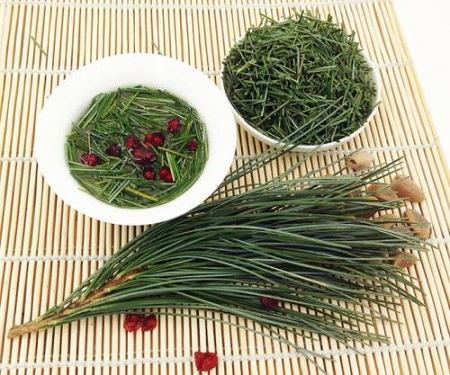We all know that pine needles are a nutrient bank. Pine needles contain: cellulose, lignin, plant enzymes, starch, tannins, proteins, volatile oils (containing 38 ingredients), resins, carotenoids (including β-carotene) Vitamin E, vitamin B1, vitamin B2, vitamin H, vitamin K, various amino acids (including 8 essential amino acids for the human body), protein-vitamin mixture, which contains a large number of various water-soluble flavonoids (including the former Anthocyanins), chlorophyll, crude protein, crude fat, fat-soluble vitamins A and vitamin C, as well as inorganic elements phosphorus, calcium, iron, manganese, zinc, magnesium, copper, selenium, nitrogen, potassium and other minerals Unsaturated fatty acids, polyisoprene and its mixtures, sterols, pigments, rutin, folic acid, catechins, various enzymes, glycerol quinine, abietic acid, shikimic acid and other medicinal ingredients.

Shikimic acid is a miraculous substance. Today let us learn about what shikimic acid is
Pharmacological effects of shikimic acid
Shikimic acid is a monomeric compound that has anti-inflammatory and analgesic effects. It can also be used as an intermediate for antiviral and anticancer drugs. Shikimic acid affects the metabolism of arachidonic acid, inhibits platelet aggregation, and inhibits arterial and venous Thrombosis and cerebral thrombosis. Preliminary research by the Pharmacology Research Laboratory of Beijing University of Chinese Medicine found for the first time that shikimic acid has significant anti-thrombotic effects and can inhibit the formation of arterial and venous thrombosis and cerebral thrombosis. In order to elucidate its anti-thrombotic mechanism, researchers studied the effect of shikimic acid on platelet aggregation and coagulation, and analyzed the relationship between its mechanism of action and arachidonic acid metabolism. The results suggest that shikimic acid may exert anti-thrombotic effects by affecting arachidonic acid metabolism, inhibiting platelet aggregation, and inhibiting the coagulation system.
1. Antibacterial and anti-tumor effects
In 1987, it was reported that Japanese scholars discovered that a compound of shikimic acid has a significant inhibitory effect on HeLa cells and Ehrlihascitescarcinoma, and can prolong the survival time of inoculated leukemia cells L1210. survival time of mice, indicating that the inhibitory effect is mainly due to the reaction of this shikimic acid compound with hydrosulfide. Another compound has no antagonistic effect on leukemia cells L1210, but has certain antagonistic effects on TrichophytonmentagrophytesATCC9972. Domestic Sun Kuilin and others conducted preliminary in vitro antibacterial and antitumor experiments on a synthesized shikimic acid derivative in 1988, proving that this compound has an in vitro inhibitory effect on leukemia cells L1210 similar to that of dimycin.
2. Effect on cardiovascular system
Sun Jianning and others from Beijing University of Chinese Medicine studied the effects of shikimic acid and its derivatives triacetylshikimic acid and isopropylideneshikimic acid on the cardiovascular system and found that the three compounds all have anti-thrombotic properties and inhibit platelet aggregation. functions, and their mechanisms of action were studied.
The shikimic acid pathway is an important metabolic pathway that exists in plants, fungi and microorganisms. This pathway has seven enzymatic processes. Dehydroquinate (DHQ) and shikimate dehydrogenase (SDH) promote stages 3 and 4 of the shikimate pathway. In most microorganisms, DHQ and SDH are monofunctional, but in plants DHQ and SDH can fuse to form enzymes with two functions. The advantage of the DHQ-SDH bifunctional enzyme is to increase the efficiency of metabolite circulation in the shikimate pathway by limiting the quality of intermediates in the competitive pathway. The Christendat group at the University of Toronto recently studied and analyzed the DHQ-SDH structure of Arabidopsis thaliana (a herbaceous plant). The researchers used the gas-phase hanging drop method to complete the co-crystallization of DHQ-SDH enzyme and shikimic acid for the first time, and then added nicotinamide adenine dinucleotide phosphate (NADP+) to the crystal to form a triple complex. The production of dehydroshikimic acid product at the DHQ site indicates that SDH-shikimic acid-NADP (H) is an active complex that is conducive to shikimic acid oxidation, and there are active sites in the concave structure of DHQ-SDH. The DHQ-SDH protein can distinguish metabolites in the shikimate pathway through face-to-face positioning, and can increase the transfer efficiency of metabolites from DHQ to the SDH domain. This model has been confirmed by the available kinetic data and suggests that SDH functions as a metabolite depositor in the shikimate pathway.
Currently, there are three sources of shikimic acid: one is extraction from plants, which is the main source of shikimic acid; the other is biosynthesis by microorganisms; the third is chemical synthesis. After reviewing the literature, it was reported that the needles of pine trees contain shikimic acid. Among them, the pine needles of Masson pine have the highest content of shikimic acid, with a content of 37.70mg/g. Therefore, pine needles have a miraculous effect on the health and protection of cardiovascular and cerebrovascular diseases.

 微信扫一扫打赏
微信扫一扫打赏

